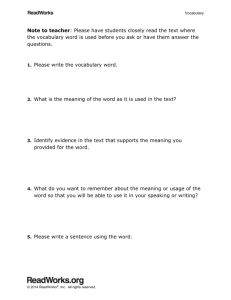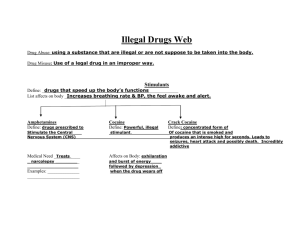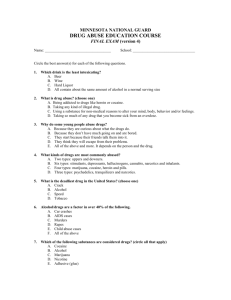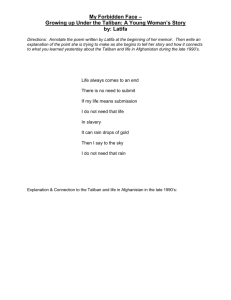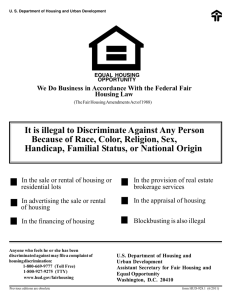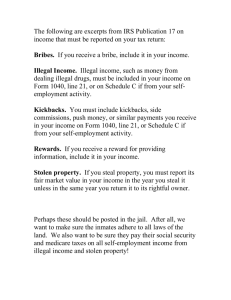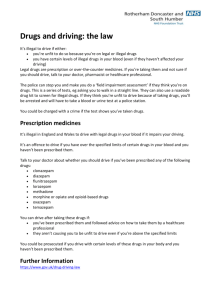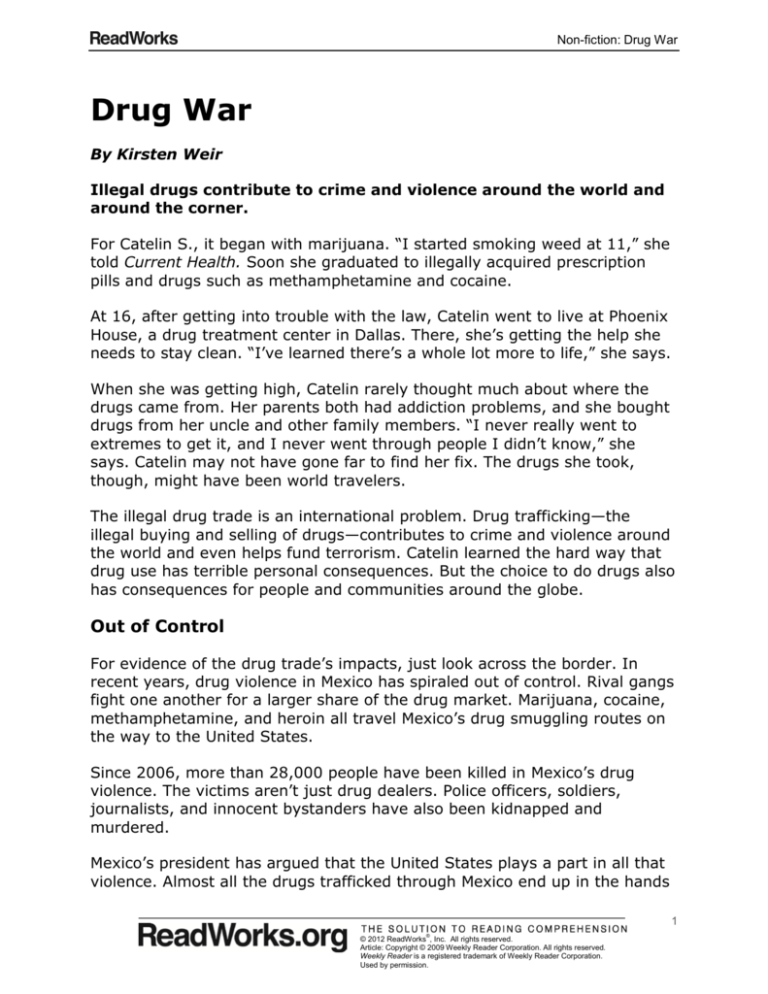
Non-fiction: Drug War
Drug War
By Kirsten Weir
Illegal drugs contribute to crime and violence around the world and
around the corner.
For Catelin S., it began with marijuana. “I started smoking weed at 11,” she
told Current Health. Soon she graduated to illegally acquired prescription
pills and drugs such as methamphetamine and cocaine.
At 16, after getting into trouble with the law, Catelin went to live at Phoenix
House, a drug treatment center in Dallas. There, she’s getting the help she
needs to stay clean. “I’ve learned there’s a whole lot more to life,” she says.
When she was getting high, Catelin rarely thought much about where the
drugs came from. Her parents both had addiction problems, and she bought
drugs from her uncle and other family members. “I never really went to
extremes to get it, and I never went through people I didn’t know,” she
says. Catelin may not have gone far to find her fix. The drugs she took,
though, might have been world travelers.
The illegal drug trade is an international problem. Drug trafficking—the
illegal buying and selling of drugs—contributes to crime and violence around
the world and even helps fund terrorism. Catelin learned the hard way that
drug use has terrible personal consequences. But the choice to do drugs also
has consequences for people and communities around the globe.
Out of Control
For evidence of the drug trade’s impacts, just look across the border. In
recent years, drug violence in Mexico has spiraled out of control. Rival gangs
fight one another for a larger share of the drug market. Marijuana, cocaine,
methamphetamine, and heroin all travel Mexico’s drug smuggling routes on
the way to the United States.
Since 2006, more than 28,000 people have been killed in Mexico’s drug
violence. The victims aren’t just drug dealers. Police officers, soldiers,
journalists, and innocent bystanders have also been kidnapped and
murdered.
Mexico’s president has argued that the United States plays a part in all that
violence. Almost all the drugs trafficked through Mexico end up in the hands
1
© 2012 ReadWorks®, Inc. All rights reserved.
Article: Copyright © 2009 Weekly Reader Corporation. All rights reserved.
Weekly Reader is a registered trademark of Weekly Reader Corporation.
Used by permission.
Non-fiction: Drug War
of American drug users such as Catelin. In fact, Mexico is the biggest
supplier of marijuana to the United States.
Elsewhere, drugs do similar damage. For decades, Colombia has grown most
of the world’s coca, the plant that is turned into cocaine. The cocaine trade
has led to high rates of violence there. In the past, the drug trade corrupted
Colombia’s justice system when powerful members of the drug gangs,
known as cartels, were elected to government positions.
Recently, western Africa has become a prime site for trafficking, says David
Mineta, deputy director of Demand Reduction, White House Office of
National Drug Control Policy. “These international criminal organizations
smuggle people, arms, and narcotics through [western] Africa,” he says.
From there, the illegal goods are transported to Europe, North America, and
other places around the world.
The Poppy Problem
The state of affairs is also grim in Afghanistan. Ninety percent of the world’s
supply of opium poppies is grown in that country. The poppies are used to
make heroin, a dangerous and highly addictive drug.
The drug money flows right into the pockets of terrorist groups, says
Gretchen Peters, author of Seeds of Terror: How Heroin Is Bankrolling the
Taliban and Al Qaeda. The Taliban are extremists who ruled Afghanistan
from 1996 to 2001. Although they no longer head the government, they are
still a powerful force in the country. U.S. forces have been fighting Talibanled rebel groups since the war in Afghanistan began in 2001.
The Taliban severely restrict women’s rights in areas they control, and they
support Al Qaeda terrorists. They also are involved in the drug business.
“The drug trade is run by trafficking organizations that work very closely
with the Taliban,” Peters says. The Taliban protect poppy farmers, drug labs,
and drug shipments in Afghanistan. In return, they demand taxes from the
people they protect. The United Nations estimated that the Taliban earned
$600 million from drug taxes between 2005 and 2008. “There’s an enormous
output of narcotics in this part of the world,” says Peters. “It’s like the
Walmart of drugs.”
In some ways, though, the situation in Afghanistan is not unique. In many
places where drugs are grown, processed, or traded, they’re linked to rebel
groups and terrorists. “What you see is a connection between organized
crime and groups that want to destabilize countries around the world,
whether it’s rebels in Colombia or the Taliban in Afghanistan or insurgents in
2
© 2012 ReadWorks®, Inc. All rights reserved.
Article: Copyright © 2009 Weekly Reader Corporation. All rights reserved.
Weekly Reader is a registered trademark of Weekly Reader Corporation.
Used by permission.
Non-fiction: Drug War
Sri Lanka or Burma,” Peters says. In other words, the drug trade directly
benefits rebels and terrorists who are making the world a more dangerous
place.
Reducing Demand
The United States is taking steps to address the international drug problem.
In Colombia, Mineta says, the U.S. government is working with the national
police force to rein in cocaine traffickers. In Afghanistan, U.S. forces are
going after drug labs and destroying stockpiles of narcotics. They are also
trying to help farmers shift to growing legal crops. But in a poor country
where many people depend on the valuable poppy crops to survive, that’s a
difficult switch. “It takes a lot of time and money and intervention,” Peters
says.
Reducing global drug violence depends on reducing demand for illegal
substances, Mineta says. The United States is the world’s biggest consumer
of illegal drugs. And teens do their fair share of drug use: According to
Students Against Destructive Decisions, half of all American teens try an
illicit drug by the time they finish high school.
As was the case with Catelin, most teens don’t give much thought to where
their drugs come from—or what illegal activity they might have fueled. But
every action, including choosing to use drugs, has a consequence. “Until we
can find a way to reduce the demand for illegal drugs,” Peters says, “we’re
going to continue to have problems.”
Homegrown Harm
Some drugs are grown or manufactured in the United States. But just
because they’re not connected to terrorism or trafficking doesn’t mean they
don’t have a harmful impact on society. Drug users are more likely to
commit crimes such as theft or assault. And drug-related gang rivalries
contribute to violence in cities across the country.
3
© 2012 ReadWorks®, Inc. All rights reserved.
Article: Copyright © 2009 Weekly Reader Corporation. All rights reserved.
Weekly Reader is a registered trademark of Weekly Reader Corporation.
Used by permission.
Non-fiction: Drug War
Bloomberg/Getty
Images
Methamphetamine
labs are a local
source of danger.
Production of methamphetamine is a growing problem. Meth is often
produced in home labs. For every pound that’s made, 5 to 6 pounds of toxic
waste is left behind. People have become ill after moving into houses that
were once meth labs.
Bottom line? Drugs are deadly—and not just for the people who use them.
Zoran Milic/iStock
4
© 2012 ReadWorks®, Inc. All rights reserved.
Article: Copyright © 2009 Weekly Reader Corporation. All rights reserved.
Weekly Reader is a registered trademark of Weekly Reader Corporation.
Used by permission.
Questions: Drug War
Name:
_____________ Date: _______________________
1. Which illegal drug is made from opium poppies?
A
B
C
D
heroin
cocaine
marijuana
meth
2. The illegal drug trade is a worldwide problem. According to the passage, all of the
following are effects of the problem EXCEPT
A
B
C
D
the reduction of crime
funding for terrorism
drug-related gang rivalries
violence around the world
3. After reading the passage, what can you conclude will most likely happen in the next
few years?
A
B
C
D
Farmers in poor countries will stop growing illegal crops.
The illegal drug trade will continue to be a problem.
Illegal drugs will no longer be grown in the United States.
Drug-related violence in Mexico will be greatly reduced.
4. Read this sentence from the passage: “‘What you see is a connection between organized
crime and groups that want to destabilize countries around the world, whether it’s rebels in
Colombia or the Taliban in Afghanistan or insurgents in Sri Lanka or Burma,’ Peters says.”
In this sentence, the word destabilize means
A
B
C
D
to
to
to
to
offer care or guidance
volunteer for a cause
upset the functioning of
fight for independence
5. Which statement supports the central idea of this passage?
A Illegal drugs contribute to crime and violence around the world.
B Catelin S. was lucky to have received help from a drug treatment center.
C Drug violence in Mexico has spiraled out of control in recent years.
D Drug users are more likely to commit crimes such as theft or assault.
1
®
© 2012 ReadWorks , Inc. All rights reserved.
Questions: Drug War
6. According to the passage, what country is the world’s biggest consumer of illegal
substances?
______________________________________________________________________
______________________________________________________________________
______________________________________________________________________
7. Author Gretchen Peters said, “There’s an enormous output of narcotics in this part of
the world. It’s like the Walmart of drugs.” What might she have meant by that?
[paragraph 3 under “The Poppy Problem”]
______________________________________________________________________
______________________________________________________________________
______________________________________________________________________
8. The question below is an incomplete sentence. Choose the word that best completes
the sentence.
Drugs such as marijuana, cocaine, methamphetamine, and heroin have been smuggled
______ Mexico to the United States.
A
B
C
D
before
from
to
as
2
®
© 2012 ReadWorks , Inc. All rights reserved.
Questions: Drug War
9. Answer the following questions based on the sentence below.
In Afghanistan, U.S. forces are addressing the international drug problem by going after
drug labs and destroying stockpiles of narcotics.
Who? U.S. forces
Where? ________________________________________________________________
(are doing) What? _______________________________________________________
How? _________________________________________________________________
10. Vocabulary Word: intervention: the process of coming between in order to change
a course of events.
Use the vocabulary word in a sentence: ______________________________________
______________________________________________________________________
______________________________________________________________________
3
®
© 2012 ReadWorks , Inc. All rights reserved.
Teacher Guide & Answers
Teacher Guide & Answers: Drug War
Passage Reading Level: Lexile 1140
Featured Text Structure: Cause/Effect – the writer presents the reason an event happened and its
results
Passage Summary: “Drug War” describes how illegal drugs are contributing to crime and violence
around the world.
1. Which illegal drug is made from opium poppies?
A
B
C
D
heroin
cocaine
marijuana
meth
2. The illegal drug trade is a worldwide problem. According to the passage, all of the following are effects
of the problem EXCEPT
A
B
C
D
the reduction of crime
funding for terrorism
drug-related gang rivalries
violence around the world
3. After reading the passage, what can you conclude will most likely happen in the next few years?
A
B
C
D
Farmers in poor countries will stop growing illegal crops.
The illegal drug trade will continue to be a problem.
Illegal drugs will no longer be grown in the United States.
Drug-related violence in Mexico will be greatly reduced.
4. Read this sentence from the passage: “‘What you see is a connection between organized crime and
groups that want to destabilize countries around the world, whether it’s rebels in Colombia or the Taliban
in Afghanistan or insurgents in Sri Lanka or Burma,’ Peters says.”
In this sentence, the word destabilize means
A
B
C
D
to offer care or guidance
to volunteer for a cause
to upset the functioning of
to fight for independence
5. Which statement supports the central idea of this passage?
A
B
C
D
Illegal drugs contribute to crime and violence around the world.
Catelin S. was lucky to have received help from a drug treatment center.
Drug violence in Mexico has spiraled out of control in recent years.
Drug users are more likely to commit crimes such as theft or assault.
1
© 2012 ReadWorks®, Inc. All rights reserved.
Teacher Guide & Answers: Drug War
6. According to the passage, what country is the world’s biggest consumer of illegal substances?
Suggested answer: The United States is the world’s biggest consumer of illegal drugs.
[paragraph 2 under “Reducing Demand”]
7. Author Gretchen Peters said, “There’s an enormous output of narcotics in this part of the world. It’s like
the Walmart of drugs.” What might she have meant by that? [paragraph 3 under “The Poppy Problem”]
Suggested answer: Peters probably meant that so many narcotics are being shipped out of Afghanistan
that they’re as common and widespread as the popular international chain store Walmart.
8. The question below is an incomplete sentence. Choose the word that best completes the sentence.
Drugs such as marijuana, cocaine, methamphetamine, and heroin have been smuggled ______ Mexico to
the United States.
A
B
C
D
before
from
to
as
9. Answer the following questions based on the sentence below.
In Afghanistan, U.S. forces are addressing the international drug problem by going after drug labs and
destroying stockpiles of narcotics.
Who? U.S. forces
Where? in Afghanistan
(are doing) What? are addressing the international drug problem
How? by going after drug labs and destroying stockpiles of narcotics
10. Vocabulary Word: intervention: the process of coming between in order to change a course of
events.
Use the vocabulary word in a sentence: answers may vary.
2
© 2012 ReadWorks®, Inc. All rights reserved.

